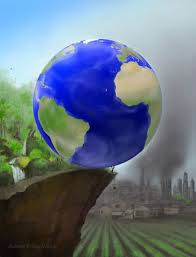I often wonder how future historians will marshal their evidence of our generation’s perplexing deafness to the warnings of environmental science. What symbolic folly will they sift from the shipwreck of contemporary culture?
I recently stumbled across an apt if somewhat frivolous example. It should first be said that last week was anything but frivolous on the prognosis for the planet. On three successive days, earth scientists bombarded us with reminders that their work is not being taken seriously.

The Governor of California was presented with a Consensus Statement signed by 500 global scientists warning that “human quality of life will suffer substantial degradation by the year 2050.” The Bonn Declaration on Global Water Security concluded that, in a similar timeframe, more than half of the world’s population “will be living under the handicap of severe pressure on fresh water.” The State of Nature report brings the distressing news that over 30% of UK wildlife species have “declined strongly” in a period shorter than my lifetime.
There’s nothing new about these set piece broadsides but the language is becoming more explicit, as though despairing in advance of the poor media coverage that invariably ensues. The science community is not a happy bunny in the Anthropocene.
Yet, as Professor Jeffrey Sachs told the UN General Assembly a couple of weeks ago, in an uncharacteristic mixed metaphor: “in 41 years since the Stockholm Conference (on the Human Environment) we have not changed the needle, even an iota.”
It was another speech at this General Assembly thematic debate on sustainable development and climate change that offered me a little wry amusement. Professor Johan Rockstrom, Director of the Stockholm Resilience Centre and one of the world’s most persuasive voices on the threat to “planetary boundaries”, had been summoned to speak.
The static camera position in the UN chamber can sometimes capture the antics of unsuspecting platform members alongside the speaker. The first two minutes of Rockstrom’s speech juxtaposed his apocalyptic language on the fate of humanity with the inability of a hapless official from the General Assembly Secretariat to concentrate. Here in microcosm was the failure of global governance to listen to its own chosen experts.
Rockstrom: I speak not for the sake of the planet but for the sake of the future of the world as we know it
UN official: beckons to unseen aide
Rockstrom: we are hitting the ceiling of ecological capacity of the planet to support the world
UN official: conducts genial chat with aide
Rockstrom: we are in the 6th great extinction of biodiversity on the planet
UN official: scrutinises and replies to cellphone messages
Sure, it’s unfair to pick on unguarded moments, but that future historian will have no scruples in selecting material.
I too was feeling a little unscrupulous as, in response to the New York summons, Rockstrom cancelled a lecture that I had hoped to attend. The STEPS research centre in Brighton has been probing the heart of the dilemma in the current post-2015 debate.
Many scientists say that a stable environment is a prerequisite for hopes of ending world poverty. The world’s poorest countries say that poverty reduction comes first.
Rockstrom is known to be fully engaged with this challenge which remains far from resolved in all the current discussion about a new set of Sustainable Development Goals.
I wonder whether he regrets his switch of venue. Everyone at STEPS would have listened to what he had to say.
******
Consensus Statement from Global Scientists
Bonn Declaration on Global Water Security
UN General Assembly thematic debate (Sachs starts at 25.00, Rockstrom at 1:57.45)
Sustainable Development Goals – Tread Softly briefings